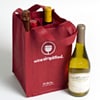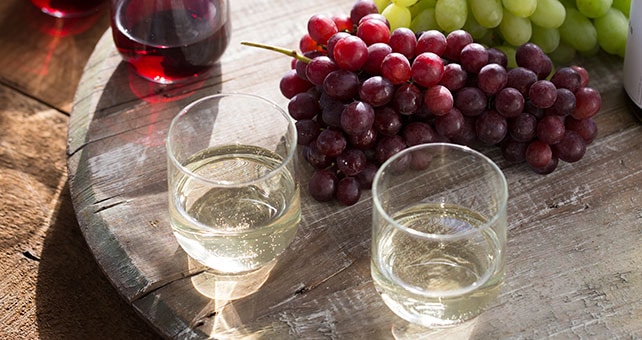You’ll find lots of beautiful and helpful information on wine labels: vineyard, region, grapes, age. But some terms can confuse. Take designations of “organic,” “biodynamic,” “sustainable,” and “natural.” What do they mean for how the wine was produced—and for you as you choose bottles to share and enjoy?
Those four terms may describe the process of winemaking or the wine. Here’s a quick rundown of what to remember.
Organic Wine
![]() “Organic” wine has a special and more formal meaning than the other three terms. This is because organic wine is certified by a USDA-recognized third-party certifier. That authority distinguishes which practices are allowed and which are not.
“Organic” wine has a special and more formal meaning than the other three terms. This is because organic wine is certified by a USDA-recognized third-party certifier. That authority distinguishes which practices are allowed and which are not.
Organic wine is divided into two categories:
- Certified organically grown grapes, which avoid synthetic pesticides and additives
- Organic wines, made from organically grown grapes and without any added sulfites besides what are naturally produced when fermentation converts grape juice into wine
Biodynamic
There’s no official government regulation of what is or is not “biodynamic” wine. However, an independent rule-making organization, Demeter, sets standards for winemakers that choose to participate. The biodynamic label cannot be used without Demeter certification. Yearly checkups are performed. Being organic makes the certification process quicker.
Biodynamic winemaking incorporates holistic ideas about a vineyard as part of an entire ecosystem. Everything is cyclical and connected, including the patterns of the earth, and animals that graze and trim vegetation. The system prohibits use of synthetic chemicals. Biodynamic wine uses grapes farmed through these ecologically balanced agricultural methods, and the winemaking does not include manipulations such as yeast additions or acidity adjustments.
Sustainable Wine
As with biodynamic wine, there’s no government oversight in the use of this term, so you must research what the winery does. Very often the winery follows practices that are ecologically sound, economically viable, and socially responsible. But “sustainable” does not necessarily mean the grapes are produced or grown without pesticides or herbicides. Certifications are available from some third-party agencies, but wineries can claim they’re sustainable without certification.
Natural Wine
“Natural” wine is the least formally defined of the four since the winery identifies it with self-imposed standards. No official or legal classification or standard set of operating procedures defines the category. And, like sustainable wine, the US government does not regulate the term.
Publix carries a number of organic, sustainable, and natural wines. Here area few:
Benziger Wines
Benziger Wines, made by a family-owned winery in California, are certified as sustainable, organic, and biodynamic. Biodynamic farming embraces an ethical, ecological, and holistic approach to farming. It focuses on growing grapes without chemicals as well as creating a whole ecosystem with the vineyard—plus, the winemakers don't make any yeast additions or tinker with acidity.
Natura Wines
Made from organically-grown, hand-picked grapes grown in Chile's Central Valley, the Natura collection by Banfi includes three white wines and four red wines. To ensure a healthy growing environment, even compost is sourced at the vineyard and made from spent grape skins and stems.
Bota Box
Sustainable packaging and a certified sustainable winery distinguish Bota Box wines. The packaging is 100% recyclable, and the wine bag is BPA-free.
Wild Horse Winery
Located in the central coast of California wine country, Wild Horse Winery focuses on sustainable viticultural practices, as well as blending grapes from different terroirs in the region.
Fetzer Vineyards
The first Certified Zero Waste Wine Company in the world, Fetzer Vineyards is committed to regeneration and restoration. Receiving this third-party certification means the company is dedicated to improving local ecosystems and watersheds, as well focusing on the health and well-being of their employees and local communities. The company also operates with 100% renewable energy.
The Dreaming Tree Wines
The Dreaming Tree wines are made by a certified California Sustainable Winegrowing winery. The winery is part of a unique solar initiative in California, uses less glass in its bottles, and relies on 100% recycled paper labels.
Publix promotes responsible drinking and supports efforts to fight alcohol abuse and underage drinking. Please visit the Foundation for Advancing Alcohol Responsibility at www.responsibility.org for more information.

 You are about to leave publix.com and enter the Instacart site that they operate and control. Publix’s delivery and curbside pickup item prices are higher than item prices in physical store locations. Prices are based on data collected in store and are subject to delays and errors. Fees, tips & taxes may apply. Subject to terms & availability. Publix Liquors orders cannot be combined with grocery delivery. Drink Responsibly. Be 21. For prescription delivery, log in to your pharmacy account by using the Publix Pharmacy app or visiting
You are about to leave publix.com and enter the Instacart site that they operate and control. Publix’s delivery and curbside pickup item prices are higher than item prices in physical store locations. Prices are based on data collected in store and are subject to delays and errors. Fees, tips & taxes may apply. Subject to terms & availability. Publix Liquors orders cannot be combined with grocery delivery. Drink Responsibly. Be 21. For prescription delivery, log in to your pharmacy account by using the Publix Pharmacy app or visiting 

